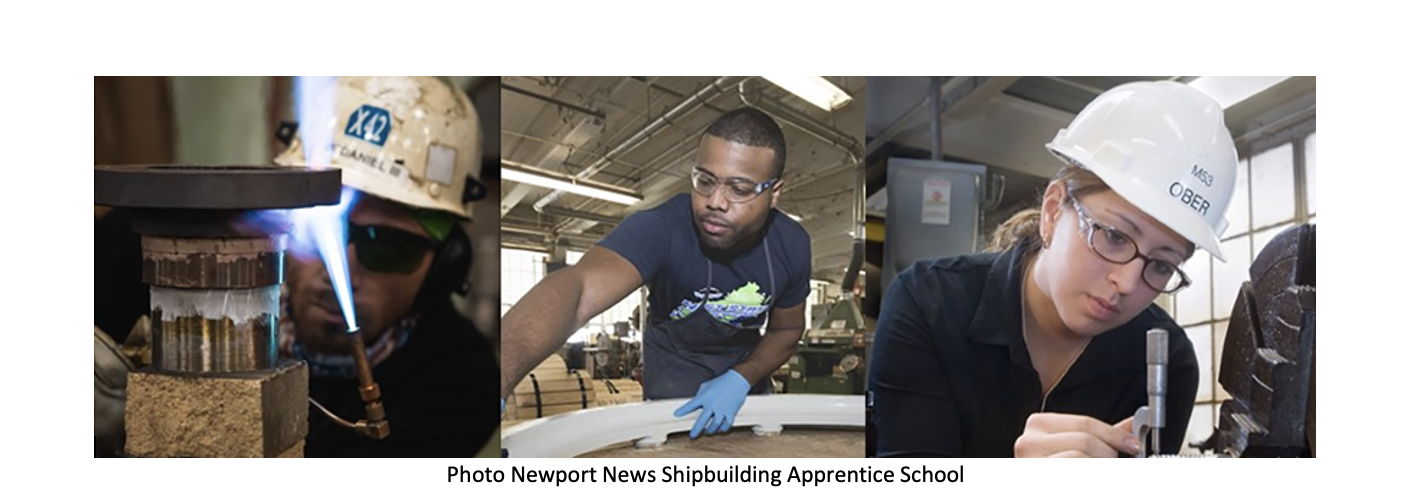Training Within Virginia (TWV) – Closing the Skills Gap by Learning on the Job
America needs more skilled career-ready citizens for sustaining and bringing good paying jobs back home to grow the wealth of our citizens while becoming more globally competitive. In 1940 the United States went to war in Europe and millions of men left jobs in manufacturing and other critical supply chain operations. This created an unexpected skills gap in the workforce and made it necessary to recruit millions of people who had never worked in manufacturing to be trained to produce quality products and services to win the War.
To address this dilemma, the US developed the Training Within Industry (TWI) programs. TWI programs transformed U.S. manufacturers into lean, mean production machines to help win the war. This accomplishment led to an economic boom following the war that propelled millions of Americans with “employable skills” into the middle class. Today, Virginia and the nation face a similar shortage of skilled career-ready citizens. Much like the skills shortage during WWII. So many students leaving high school and heading off to college has generated a critical shortage of career-ready citizens with “employable skills” to fill all the help wanted opportunities.For the longest time, everyone has been told a 4-year college degree is the only way to succeed. In his new book, Terry Iverson challenges the assumption that sustainable careers may only be achieved through a college education. Iverson contends that careers in manufacturing offer stability, security, and prosperity for our entire nation. Inspiring Champions in Advanced Manufacturing provides parents and students a roadmap for career success, self-fulfillment, and a zero-debt foundation for new-collar professions.
While 92% of Virginia’s population has obtained their high school diploma or its equivalent, 42.2% of the population have earned a bachelor's degree and 18.6% have secured a graduate degree, both above the national averages. Between 2020 and 2030, the Bureau of Labor Statistics projects that about 60% of new jobs in the economy will be in occupations that don’t typically require an associate, bachelor’s, or graduate degree.
The U.S. Chamber of Commerce reports as of August, Virginia is grappling with a workforce shortage, evident by the fact that there are only 47 available workers for every 100 open job positions in the state.Just like TWI replenished the US workforce to win the war for the US. Virginia is using Training Within Virginia (TWV) initiatives with its programs to close the skills gap. Learn about the policy changes and the resources being offered in Virginia to guide and prepare students and current employees to become skilled or reskilled for all the good paying new-collar professions.
Virginia Governor Glenn Youngkin joined the growing number of states and private employers who are adopting skills-based hiring practices. The Commonwealth will change its hiring practices by eliminating degree requirements, preferences, or both for almost 90% of state classified positions to extend opportunities to all Virginians. “This is great news for the state government and all job seekers. By giving equal consideration to applicants with an equivalent combination and level of training, knowledge, skills, certifications, and experience we have opened a sea of opportunity at all levels of employment for industrious individuals who have the experience, training, knowledge, skills, abilities, and most importantly, the desire to serve the people of Virginia,” said Secretary of Labor Bryan Slater. In Virginia, schools are collaborating with local businesses to provide CTE High-Quality Work-Based Learning (HQWBL) opportunities for students to focus on the different types of methods of instructional preparation and take place in partnership with local businesses or organizations in a real-world work environment. The schools, in partnership with local businesses, are offering learning opportunities. Job shadowing, service learning, mentorship, externship, school-based enterprise, internship, entrepreneurship, clinical experience, cooperative education, youth registered apprenticeship, and registered apprenticeship are being deployed. The state’s Youth Registered Apprenticeship programs are still evolving in response to the needs of students, parents, and employers. Through a coordinated effort involving business and industry, YRA addresses the dual role of preparing students for the world of work and providing Virginia with a highly skilled workforce. Local school systems can work with business and industry partners to identify opportunities for youth employment based upon the occupational instruction offered at the school. The objective of YRA is to expand the state’s skilled workforce by providing young people with career opportunities while completing their high school education.Moving Forward
America and Virginia are tasked with the challenges of expanding its industrial and digital capabilities to be globally competitive by replenishing the talent pipeline with skilled workers. Harry Moser, Founder/CEO of the Reshoring Initiative® states “a strong skilled workforce is key to reshoring and manufacturing growth. Development of a skilled workforce begins with motivating a higher quantity and quality of recruits. The key for reshoring is to change some of the misperceptions about manufacturing and help communities develop skilled professionals”.
It’s time for Virginia’s students to look at acquiring the employable skills that can be obtained through low and or debt-free education to fill the growing demand for good paying skilled career-ready citizens. Thus, making their “American Dream” a reality in Virginia.Glenn Marshall, the Association for Manufacturing Excellence (AME) leads an initiative for a “Manufacturing and Educational Renaissance,” member of the Reshoring Initiative, Job Creators Network, and Industry Reimagined 2030. Contact Glenn Marshall and www.ame.org.
- - -

